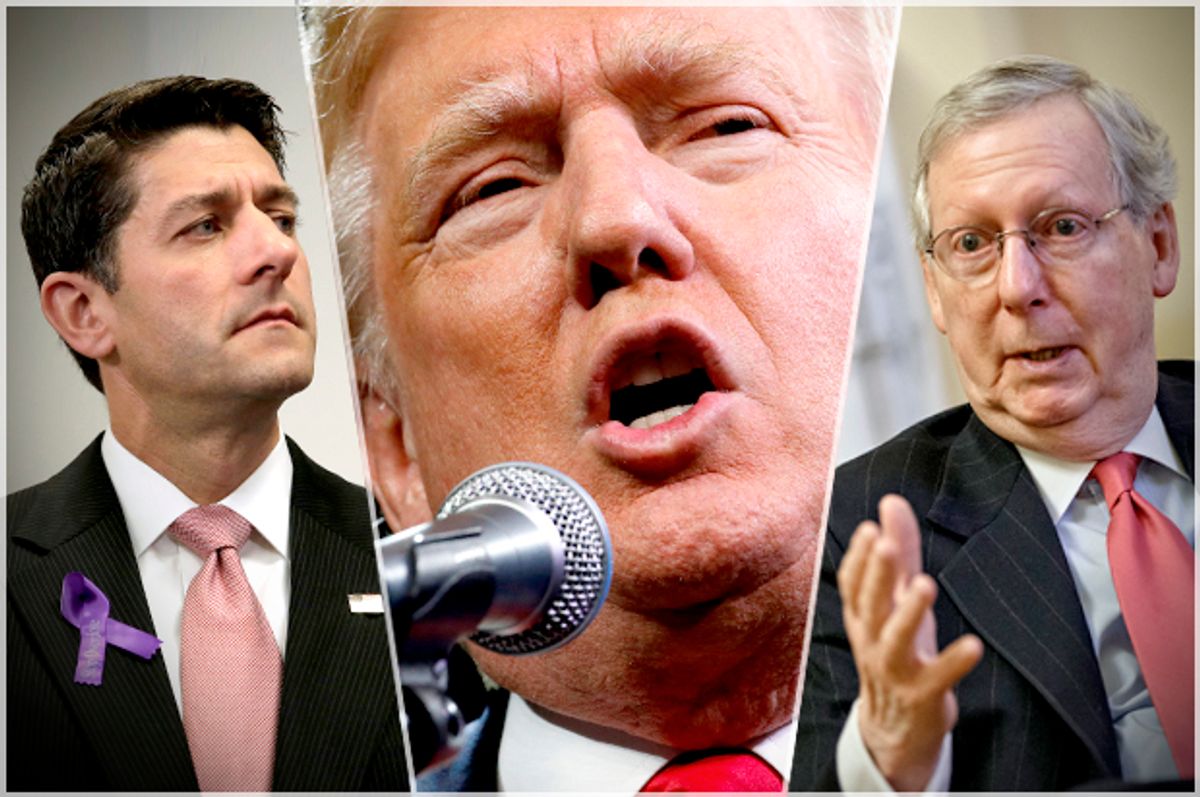It’s not every day that you see a major-party presidential candidate declare himself an extremist, but Donald Trump did precisely that during his big speech on national security on Monday, freely volunteering that his proposed policy for vetting immigrants is, by his own description, “extreme.” After ticking off a series of atrocities committed by “immigrants or the children of immigrants” in the U.S., Trump offered his answer for tackling the allegedly uncontrolled wave of immigrant-linked violence. “We should only admit into the country those who share our values and respect our people. In the Cold War, we had ideological screenings. The time is overdue to develop a new screening test for the threats we face today. I call it ‘extreme vetting.’ I call it extreme – extreme – vetting.”
“Extreme vetting” – at this point it’s more of a branding exercise than an actual policy, the sort of proposal you’d expect to emerge from a Doritos marketing meeting, not a presidential campaign. But, again Trump is a major-party candidate for the presidency, so we have to take seriously what he says and explore the ramifications of what he’s proposing.
When Trump said that we had ideological screenings for aliens seeking entrance to the country, he was absolutely correct. The McArran-Walter Act of 1952 established guidelines for excluding immigrants who were found to be communists, anarchists, or engaged in other “subversive” activities, and provided the Attorney General power to exclude from the country aliens determined to “be prejudicial to the public interest, safety, or security.” Harry Truman vetoed the bill, calling those exclusionary provisions “worse than the infamous Alien Act of 1798,” and warning that “to punish undefined ‘activities’ departs from traditional American insistence on established standards of guilt. To punish an undefined ‘purpose’ is thought control.” Truman’s veto was overridden and the bill became law.
Those ideological exclusion provisions were extremely vague and unevenly applied, and they allowed the executive branch to deny entry to pretty much anyone whose political views they disagreed with –famous intellectuals like Graham Green, Pablo Neruda, and Gabriel Garcia Marquez were all denied visas under the law, according to the ACLU’s timeline. As the Cold War ebbed and the paranoia over communist infiltration receded, the law came under sustained criticism until portions of it were thrown out in 1990, including the ideological exclusion provisions.
So let’s get back to what Trump is proposing. In his vision, the “extreme vetting” system will weed out as inadmissible all the peoples of the world who do not “share our values and respect our people.” Here are the criteria he established:
In addition to screening out all members or sympathizers of terrorist groups, we must also screen out any who have hostile attitudes towards our country or its principles – or who believe that Sharia law should supplant American law. Those who do not believe in our Constitution, or who support bigotry and hatred, will not be admitted for immigration into the country.
These are fantastically vague metrics, even vaguer than the 1952 immigration legislation Trump approvingly cites. Trump, of course, is referring specifically to the Muslim population of the world and suggesting quite strongly that Muslim values are incompatible with “our” values. But so many other people can be wrapped up in this. What does it even mean to “believe in our Constitution”? What qualifies as “bigotry and hatred”? Would someone who, for example, argues that a federal judge can’t do his job because of his ethnicity be qualified for exclusion? "Hostile attitudes" towards the United States are not prohibited by law – indeed, they're expressly permitted under the constitution Trump wants all immigrants to "believe in."
There’s a lot to chew over here – flagrant nativism, galling xenophobia, etc. – and based on what little we know about Trump’s policy it seems “patently unlawful.” That means a future president Trump would probably have to go to Congress to change the law if he wants to implement this “extreme” measure. And that puts the ball in Paul Ryan’s and Mitch McConnell’s court. They've already both indicated opposition to Trump's blanket ban on Muslim immigration, but this is a different issue – he's proposed a rewrite of the mechanism by which immigrants are granted admission to the country. They both support Trump for the presidency, and (in the event of a Trump win) would be the two people responsible for implementing his policies, so now it’s on them to explain what they think about Trump’s “vetting” proposal and whether they’re willing to go along with this “extreme” agenda.

Shares